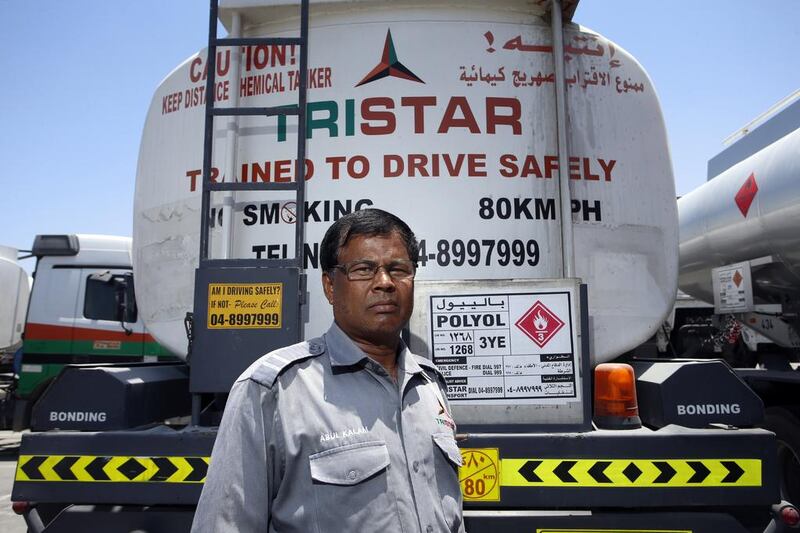DUBAI // The hot, long summer days bring more challenges for lorry drivers on the road but every effort should be made to avoid catastrophic and fatal accidents, an academic warns.
High temperatures can cause fatigue and exhaustion, which could reduce a driver’s concentration, vigilance and alertness and increase the risk of a crash.
Drivers should be more prudent during Ramadan, said Dr Daniel Albuquerque, assistant professor of transportation engineering at UAE University.
“Tailgating and speeding should be rigorously avoided, as drivers’ reaction time may be slower than what it would be if drivers were not fasting,” he said.
“Ultimately, they need to keep in mind that driving is a mentally demanding activity. Since their ability to focus and react may be temporarily impaired due to long fasting periods, driving may not be a safe activity to be involved in.”
Bangladeshi Mohammed Abdul Kalam, who has been driving a tanker lorry for the past 16 years, said he makes sure to get enough rest to drive safely during his shift.
“I get up at 3am for suhoor and then perform my morning prayers,” said the 56-year-old father-of-three.
“I try to get some rest for an hour before reporting for duty at 6am. I finish duty very early to avoid traffic peak hours and fatigue.”
Individual drivers and transport companies are both faced with the challenge of driving safely on roads during this holy month, said Mohammed Akber, general manager for health and safety at Tristar, a liquid logistics solutions provider.
“The fact that Ramadan often falls during summer, combined with fewer hours of sleep, irregular meal times, dehydration, low blood sugar, evenings full of social obligations and prolonged night prayer leads to fatigue and diminishes one’s ability to remain alert and focused on the road,” he said.
“The pressure to complete the job within reduced working hours, traffic rush before iftar, road rage and impatience by other drivers, traffic jams near markets and shopping centres, especially during the last 10 days, puts additional stress on drivers, which often leads to accidents.”
Mr Abdul Kalam and his colleagues have flexible working hours during Ramadan.
“It is very difficult to drive during this time but we are well trained to overcome this situation,” he said.
“We are not allowed to drive continuously as per our company’s journey management policy.”
When lorry drivers are well rested, alert and focused on safety, the roadways are much safer, Mr Abdul Kalam said.
“I make sure to rest for 15 minutes after driving for two hours, or take half-hour breaks after four hours of driving,” he said.
“If I feel sleepy, I wash my face and hands with a wet towel. When I stop to rest, I take a walk around the tanker to check the tyres.”
At Tristar, a mandatory safety briefing session is conducted with drivers by supervisors before each dispatch.
“They check the physical condition of the drivers, explain the routes’ hazards, remind them of the Tristar road-safety golden rules, and check the vehicle to ensure a safe journey,” Mr Akber said.
A special training programme has been designed for fasting drivers on managing sleep, performing daily exercise and weight management, the right diet for suhoor and iftar, keeping cool during the summer, using safer routes and avoiding rush hours whenever possible.
Fasting drivers are also being asked to avoid road rage, expect the unexpected and take extra care when driving in Ramadan.
Ahead of Ramadan, lorry and heavy vehicle drivers at Tristar were briefed on safe driving.
“We advise them to take enough rest and if they feel tired or are not feeling well, they are told to stop at a safe location and inform their supervisor,” Mr Akber said. “Our journey management team will be vigilant at keeping track of working hours and driving hours during Ramadan.”
rruiz@thenational.ae





